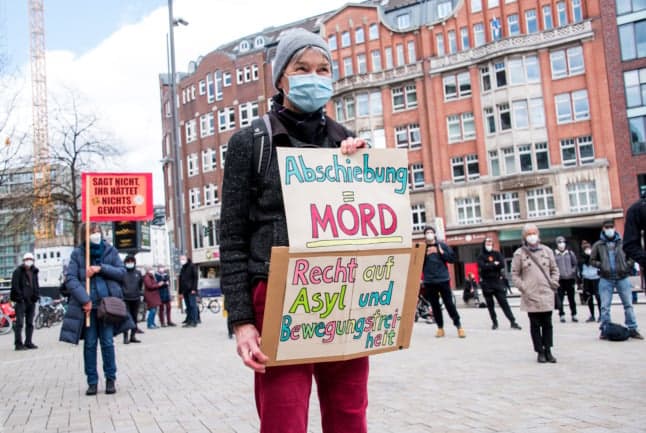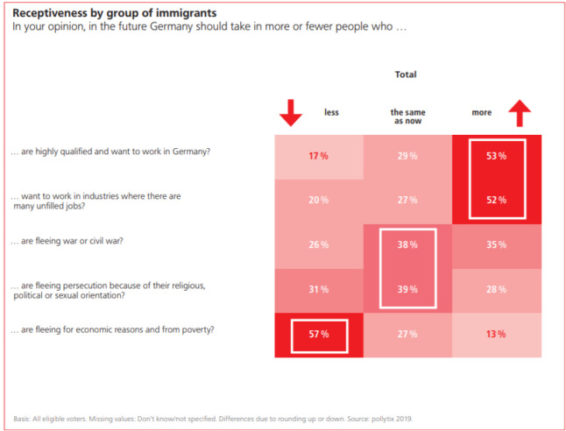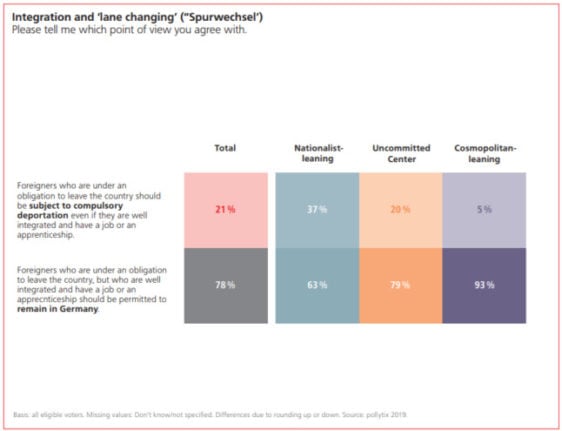What do Germans really think about immigration?

For the past few years, migration has been an increasingly divisive topic in Germany. But recent studies show that behind the headlines, the majority of Germans take a far more considered view.
The German attitude to migrants tends to be "pragmatic and middle-of-the-road" rather than dogmatic and entrenched, the Friedrich Ebert Stiftung found in its 2018-2020 study on attitudes to migration.
Though migration has become an increasingly heated topic since the refugee crisis hit its peak in 2015, most Germans believe, for example, that migration can be seen as an "opportunity for Germany", states the report.
Almost two thirds of the survey's respondents (63 percent) said migration was Germany's best chance to fill gaps in skilled labour, while around half said they believed migration enriched the country not just financially, but culturally and socially as well.
READ ALSO: What Germany's coalition plans mean for immigration and citizenship
"In contrast to what the public debate might suggest, this study shows that society is by no means split into two irreconcilable camps of vehement advocates and opponents of immigration," the authors wrote. "Only a quarter of those surveyed fall into each of these two categories respectively.
"Around half of Germans belong to a broad 'uncommitted centre' with diverse attitudes. The majority favours accepting refugees, but is also aware of the challenges that such an influx of people brings with it."
In their representative survey of 3,000 German voters, the authors divided respondents into three groups: nationalist-leaning (25 percent), cosmopolitan-leaning (25 percent) and the uncommitted centre (50 percent).
The more nationalist-leaning Germans tended to be characterised by a fear of the future and a sense that the country's economic prosperity didn't impact them personally, while cosmopolitan-leaning Germans had a higher sense of security in their lives.
Across all standpoints, however, the majority of German voters were keen to see highly qualified foreigners enter the country, as well as those who were keen to fill jobs in less popular industries.

Source: Friedrich Ebert Stiftung
Different views on different migrant groups
When it came to refugees - one of the most emotive issues in the migration debate - the majority of Germans also took a pragmatic view.
Seventy percent of them believe that in the future Germany should take a number of refugees comparable to that which it accepts today or even more.
Meanwhile, 76 percent of people said they thought Germany was doing either the right amount, or too little, for people fleeing war and persecution.
Economic migrants - those fleeing hardship and poverty - were generally seen in a less positive light, with 67 percent saying the government was doing 'too much' for this group of people.
Generally, however, an influx of foreigners appears to be seen as more of an opportunity than a threat, though good integration is clearly seen as important.
In fact, the vast majority of Germans, regardless of their political standpoint, said they thought people who were well integrated and had a job or traineeship in place should be allowed to stay in the country, even if they were facing deportation or didn't have a legal right to remain.

Source: Friedrich Ebert Stiftung
And when it came to fears about immigration to the country, most were far more fearful of a rise in racial hatred than the security of their own jobs.
READ ALSO: IN NUMBERS: Five things to know about Germany’s foreign population
"Concerns about the influx of refugees and migrants do exist," the authors of the study wrote. "But they are not primarily those that tend to be highlighted in the media and politics.
"For instance, the biggest fears do not involve the costs of integration or competition between locals and immigrants for jobs. Crime and terror and the influence of Islam were ranked only third and fourth on the list of concerns.
"Instead, the main worry relates to an increase in right-wing extremism and racist violence, followed by worries about increasing divisions in society."
Comments
See Also
The German attitude to migrants tends to be "pragmatic and middle-of-the-road" rather than dogmatic and entrenched, the Friedrich Ebert Stiftung found in its 2018-2020 study on attitudes to migration.
Though migration has become an increasingly heated topic since the refugee crisis hit its peak in 2015, most Germans believe, for example, that migration can be seen as an "opportunity for Germany", states the report.
Almost two thirds of the survey's respondents (63 percent) said migration was Germany's best chance to fill gaps in skilled labour, while around half said they believed migration enriched the country not just financially, but culturally and socially as well.
READ ALSO: What Germany's coalition plans mean for immigration and citizenship
"In contrast to what the public debate might suggest, this study shows that society is by no means split into two irreconcilable camps of vehement advocates and opponents of immigration," the authors wrote. "Only a quarter of those surveyed fall into each of these two categories respectively.
"Around half of Germans belong to a broad 'uncommitted centre' with diverse attitudes. The majority favours accepting refugees, but is also aware of the challenges that such an influx of people brings with it."
In their representative survey of 3,000 German voters, the authors divided respondents into three groups: nationalist-leaning (25 percent), cosmopolitan-leaning (25 percent) and the uncommitted centre (50 percent).
The more nationalist-leaning Germans tended to be characterised by a fear of the future and a sense that the country's economic prosperity didn't impact them personally, while cosmopolitan-leaning Germans had a higher sense of security in their lives.
Across all standpoints, however, the majority of German voters were keen to see highly qualified foreigners enter the country, as well as those who were keen to fill jobs in less popular industries.

Source: Friedrich Ebert Stiftung
Different views on different migrant groups
When it came to refugees - one of the most emotive issues in the migration debate - the majority of Germans also took a pragmatic view.
Seventy percent of them believe that in the future Germany should take a number of refugees comparable to that which it accepts today or even more.
Meanwhile, 76 percent of people said they thought Germany was doing either the right amount, or too little, for people fleeing war and persecution.
Economic migrants - those fleeing hardship and poverty - were generally seen in a less positive light, with 67 percent saying the government was doing 'too much' for this group of people.
Generally, however, an influx of foreigners appears to be seen as more of an opportunity than a threat, though good integration is clearly seen as important.
In fact, the vast majority of Germans, regardless of their political standpoint, said they thought people who were well integrated and had a job or traineeship in place should be allowed to stay in the country, even if they were facing deportation or didn't have a legal right to remain.

Source: Friedrich Ebert Stiftung
And when it came to fears about immigration to the country, most were far more fearful of a rise in racial hatred than the security of their own jobs.
READ ALSO: IN NUMBERS: Five things to know about Germany’s foreign population
"Concerns about the influx of refugees and migrants do exist," the authors of the study wrote. "But they are not primarily those that tend to be highlighted in the media and politics.
"For instance, the biggest fears do not involve the costs of integration or competition between locals and immigrants for jobs. Crime and terror and the influence of Islam were ranked only third and fourth on the list of concerns.
"Instead, the main worry relates to an increase in right-wing extremism and racist violence, followed by worries about increasing divisions in society."
Join the conversation in our comments section below. Share your own views and experience and if you have a question or suggestion for our journalists then email us at [email protected].
Please keep comments civil, constructive and on topic – and make sure to read our terms of use before getting involved.
Please log in here to leave a comment.